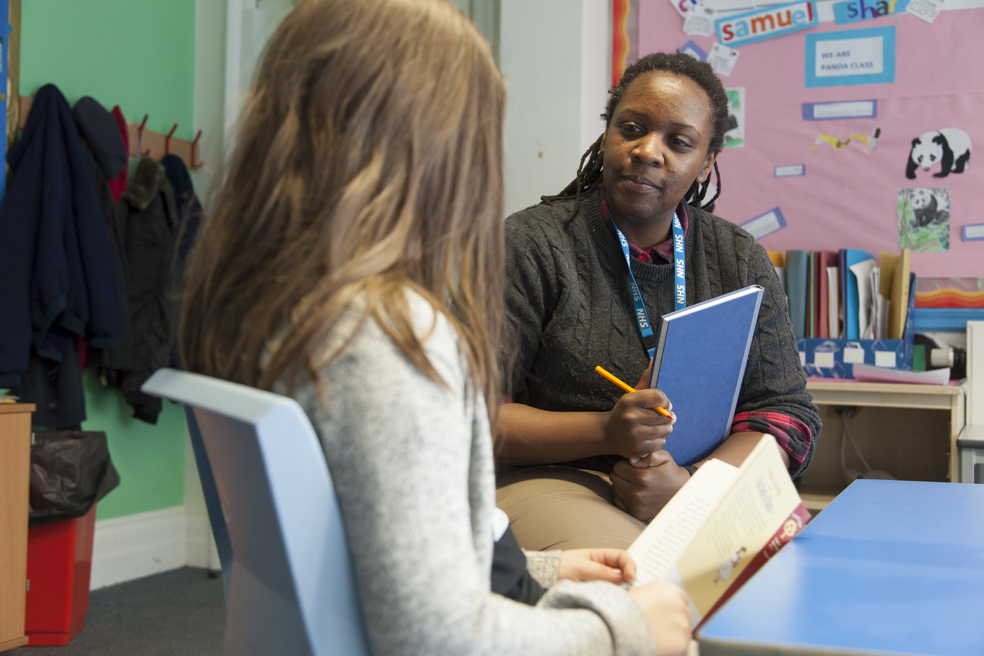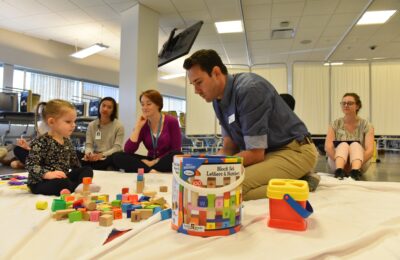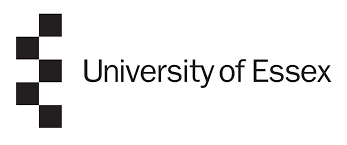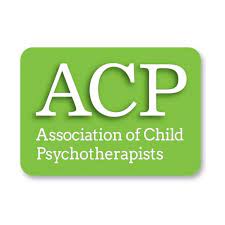
Child and adolescent psychoanalytic psychotherapy (M80)
Discover our NHS-funded, clinical training in child and adolescent psychoanalytic psychotherapy.
This internationally renowned course comprises four years of NHS clinical training in child and adolescent psychoanalytic psychotherapy.
Upon completion, you will qualify as a child and adolescent psychoanalytic psychotherapist with eligibility for membership of the Association of Child Psychotherapists (ACP), which is the registering and accrediting body for the profession. The course is validated by the University of Essex, leading to the award of a professional doctorate in child and adolescent psychoanalytic psychotherapy (DPsych).
Please note: you may see the M80 course also referred to as PCDOTP001 in communications from our application system.
About this course
Over four years, you will be employed in a full-time NHS clinical work placement and attend the Tavistock Centre every Wednesday for the course training day, where you will undertake the taught components and a research project.
The course consists of the following elements:
- individual supervision for intensive clinical work
- small group clinical supervision
- clinical seminars (assessments, beginnings, work with parents, endings, models of short-term psychotherapy and brief consultation)
- choice of specialist clinical workshops, e.g. adolescents and young adults; fostered and adopted children; early years and perinatal; trauma and early development; children who are violent, delinquent or act out sexually; narcissistic structures and eating disorders; groups and families
- experiential group relations week in year three
- theoretical lectures and reading seminars
- research teaching: methods and skills
- workshops, supervision and support for research project development, proposals and ethical approaches
- academic support and assessed academic work
- individual tutorials and departmental/clinic events.
You will also undertake supervised clinical work as a member of a clinical team, and will:
- offer long-term and short-term psychoanalytic psychotherapy to children, adolescents and young people across the age range (0-25 years old)
- gain experience and training in child psychoanalytic psychotherapy generic and specialist assessments and brief-focused therapeutic work
- gain experience with parents, carers and families of referred children
- gain experience in generic child mental health work within a multidisciplinary setting
- work with the network around a young person
- develop clinical specialism(s)
- undertake a research project.
All ACP-accredited trainings in the UK are now taught and assessed at doctoral level. On this course, the DPsych degree is awarded for completing an integrated research project at the same time as the clinical training. We think carefully about what it means to research psychoanalysis. In later years of the course, you will design and complete a project following your own emerging interests as a practitioner. Almost any aspect of the clinical work you complete as a trainee can become the focus of your thesis.
For more information, please review a selection of Frequently Asked Questions (FAQs) relating to the course.
Who is this course for?
We seek to recruit a diverse group of people who have a lively interest in, and aptitude for, working psychoanalytically in mental health services for children and young people (ages from 0-25) and their families.
Modules
Module 1: Clinical Portfolio 1
- Year of Study: Year One
- FHEQ Level: Level 8
- Credit Weighting: 60 credits
- Module Status: Core
Module Aims
- To bring together trainees’ learning from the early stages of clinical work with patients together with core concepts from psychoanalytic theory.
- To integrate learning from the Psychoanalytic Observation Studies course and the teaching of psychoanalytic theory in the first year with the beginning of clinical work.
- To advance trainees towards a capacity for critical reflection on the clinical material.
- For the trainee to take up full membership of the multi-disciplinary team in the role of trainee child and adolescent psychotherapist.
- To establish clinical work under supervision, and to begin to understand the psychoanalytic processes underpinning clinical work.
- To establish the model of learning from experience, including learning through supervision.
Module Assessment
Students are required to produce a portfolio of work, drawing on their clinical and professional practice in their training post and conceptual knowledge and skills learned during the first year of training. The portfolio will include two written assignments. The ‘Clinical Conceptualisation’ assignment comprises two 3,000 word session reports, two 250-word file summaries, and a 3,000-word transference commentary. The ‘Practice Based Learning’ assignment comprises a 1,500-word written task, reflecting on the experience of embarking on the clinical training programme. Students are also required to attend two progress review meetings, and submit associated documentation.
Module 2: Research Methods 1: Key Skills in Health Care Research
- Year of Study: Year One
- FHEQ Level: Level 8
- Credit Weighting: 30 credits
- Module Status: Core
Module Aims
- To enable trainees to acquire systematic knowledge and detailed understanding of key theoretical paradigms and techniques for research and advanced academic enquiry in child psychotherapy, comprising concepts, methodologies, designs, and methods.
- To enable trainees to develop the capacity to evaluate research critically within the context of child psychotherapy in the NHS.
- To enable trainees to undertake an advanced literature search.
- To enable trainees to gain knowledge of key contemporary empirical child psychotherapy research, including systematic reviews and meta-analyses.
- To enable trainees to learn about and practise qualitative data analysis.
Module Assessment
The assessment for this module comprises:
a 5,000-word critical bibliography demonstrating the capacity to search for and review 5-6 empirical child mental health research papers on a defined topic, including the search strategy employed, brief critical evaluations of the selected papers, and brief conclusions;
a 3,000-word qualitative analysis of a child, demonstrating the capacity to apply one of the qualitative data analysis techniques taught on the module, and to reflect on and make informed judgements about, complex issues in the absence of complete data.
Module 3: Clinical Portfolio 2
- Year of Study: Year Two
- FHEQ Level: Level 8
- Credit Weighting: 60 credits
- Module Status: Core
Module Aims
- To enable trainees to pursue an area of interest and to develop a clinical specialism.
- To acquaint trainees with relevant literature and clinical research in a specialist area of practice.
- To develop trainees’ skills in working with a particular patient population.
- To further trainees’ knowledge of the diverse roles within professional networks and to further their understanding of statutory frameworks.
- To allow trainees to increase the range of cases they are working with and, with the help of the supervisor, ensure they are working with a balance of ages, genders, backgrounds and presenting problems. Trainees may gain experience in working with people from a wide range of ethnicities/heritages, including when necessary, working with translators.
- To develop trainees’ capacity to work with complexity, and develop their awareness of the impact of differences and trauma on the psychosocial and internal worlds of the young people and families they work with.
- To support trainees to progress in their capacity to undertake intensive casework, estbalishing their capacity to use supervision, including intensive case supervision.
- To support trainees to undertake an increased range of assessments, and begin therapeutic work with parents and other specialist work.
- To support trainees in becoming more familiar with working with colleagues from different professional backgrounds, and undertaking co-working of cases, discussing cases from a psychoanalytic perspective in their multi-disciplinary team meetings.
Module Assessment
Students are required to produce a portfolio of work, drawing on their clinical and professional practice in their training post and conceptual knowledge and skills learned during the first year of training. The portfolio will include two written assignments. The ‘Clinical Conceptualisation’ assignment comprises a 6,000-word account of clinical work linked to an area of specialist clinical practice. The ‘Practice Based Learning’ assignment comprises a 1,500-word written task, reflecting on the experience of becoming fully engaged in long term casework, particularly the intensive training cases and associated individual supervisions, and work with parents/carers. Students are also required to attend two progress review meetings, and submit associated documentation.
Module 4: Research Project Development
- Year of Study: Year Two
- FHEQ Level: Level 8
- Credit Weighting: 30 credits
- Module Status: Core
Module Aims
- To develop trainees’ ability to conceptualise, design, and undertake ethically sound small-scale quantitative and qualitative data collection and analysis projects within the context of child psychotherapy in the NHS.
Module Assessment
Students are required to submit a 4,000-word research dissertation project proposal, demonstrating the capacity to conceptualise and design a proposal with appropriate scope, complexity, and sophistication. Students must also complete an ethical application document and all associated documents appropriate to the project.
Module 5: Clinical Portfolio 3
- Year of Study: Year Three
- FHEQ Level: Level 8
- Credit Weighting: 90 credits
- Module Status: Core
Module Aims
- To develop the capacity to formulate psychoanalytic ideas and hypotheses in relation to the assessment of children and adolescents so as to make informed decisions about treatment.
- To help trainees to understand the critical differences between a report of an assessment for psychotherapy and a state of mind assessment.
- To teach trainees how to formulate psychoanalytic ideas and hypotheses in relation to clinical assessments and treatment and to translate these into clear, jargon-free communication in the best interests of their patients.
- To support trainees to have have an established caseload of weekly and intensive 3 times weekly psychotherapy cases with children and young people of different ages, genders and presenting problems, family work and therapeutic parent work.
- To support trainees in making consistent progress in their capacity to understand their patients’ communications and in their ability to respond to patients appropriately, based on a sound understanding of psychoanalytic concepts and the impact of trauma, difference and diversity such as socio-economic, ethnicity, sexuality, disability and gender on the work.
- To enable trainees to write clearly, succinctly and in a style appropriate to a range of tasks, in language that is meaningful and accessible to other professionals, young people, families and carers.
- To help trainees to develop skills in summarising from a large amount of clinical experience/data. This is with the aim of capturing the significant and key clinical facts that are relevant to the context of the report.
- To develop trainees’ ability to make recommendations which are firmly based on clinical evidence and realistic, and to explain the underpinning rationale for each recommendation.
- To acquaint trainees with the tasks and structures of key external agencies and to locate the role of the child psychotherapist in complex professional networks.
- To support trainees to undertake therapeutic parent work with a parent or parental couple whose child or adolescent may or may not be in child psychotherapy treatment.
- To support trainees to be full active members of their multi-disciplinary teams, contributing to all areas of team development, and developing their clinical practice in an area of specialist interest, usually linked to their research project.
- To support trainees to engage in joint-thinking with their service supervisors in relation to case management. There is joint reflection and discussion about the criteria for ending cases, e.g. when sufficient change has taken place in the patient.
- To encourage trainees to apply learning from the Group Relations Conference to develop their understanding of power and authority in team and inter agency dynamics, and the significance of race and gender as well as other aspects of difference, in groups and organisations. Trainees will experience and learn about this in relation to their own functioning.
- To develop trainees’ experience of communicating in writing with professionals in the multi-agency network on complex matters.
Module Assessment
Students are required to produce a portfolio of work, drawing on their clinical and professional practice in their training post and conceptual knowledge and skills learned during the first year of training. The portfolio will include two written assignments. The ‘Clinical Conceptualisation’ assignment comprises 3-5 anonymised reports or significant letters written for external agencies, demonstrating awareness of role and task, totalling 6,000 words. The ‘Practice Based Learning’ assignment comprises a 1,500-word written task, reflecting on the experience of being an established member of a clinical team in placement and on beginning to develop areas of particular interest or clinical specialism. Students are also required to attend two progress review meetings, and submit associated documentation, and to attend a Group Relations Conference.
Module 6: Clinical Portfolio 4
- Year of Study: Year Four
- FHEQ Level: Level 8
- Credit Weighting: 90 Credits
- Module Status: Core
Module Aims
- To enable trainees to write a paper which demonstrates their clinical knowledge, skills and understanding, as well as their grasp of psychoanalytic theory and practice and relevant research. The paper gathers together key elements the trainee’s learning from all strands of the course.
- To develop the clinical competencies required to become fully qualified child and adolescent psychotherapists registered as full members of the Association of Child Psychotherapists.
- To begin to develop trainees’ teaching and supervision skills, and where possible to gain experience in the supervision of a practitioner or trainee from another professional discipline wishing to develop their understanding of how psychoanalytic ideas can enhance their practice.
Module Assessment
Students are required to produce a portfolio of work, drawing on their clinical and professional practice in their training post and conceptual knowledge and skills learned during the first year of training. The portfolio will include two written assignments. The ‘Clinical Conceptualisation’ assignment comprises an 11,000-word clinical case study. The ‘Practice Based Learning’ assignment comprises a 3,000-word written task, reflecting on the training programme in its entirety and thinking ahead to future plans and ambitions. Students are also required to attend two progress review meetings, and submit associated documentation.
Module 7: Research Project
- Year of Study: Years 2 – 4
- FHEQ Level: Level 8
- Credit Weighting: 180 credits
- Module Status: Core
Module Aims
- To develop the capacity to conceptualise and design a doctoral project that makes a small, but original, contribution to the literature and evidence base on psychoanalytic psychotherapy.
- To develop the capacity to assess issues of feasibility and scope in the design of their research project and as they arise in the course of the work.
- To implement their research study within the context of child psychotherapy in the NHS, so as to be able to continue to undertake these activities at an advanced level, contributing substantially to the development of new techniques, ideas, or approaches.
Module Assessment
Students must complete a Research Project comprising a 24-28,000-word Research Thesis. This may be presented either as a single dissertation or as 3 linked articles of 6-8,000 words each plus appropriate linking passages.
Course details
In order to undertake this course, we ask that you:
- have completed our Perinatal, child, adolescent and family work: a psychoanalytic observational approach (M7) course or equivalent. Completion must be to at least Postgraduate Diploma level or to Master’s level if you do not already hold a UK honours degree. For overseas qualifications, equivalence of academic level to a UK honours degree can be confirmed by NARIC. An ‘equivalent’ programme will deliver comparable learning outcomes e.g. two years of psychoanalytic baby observation, at least one year of work discussion seminars, psychoanalytic theory lectures and seminars, etc;
- have substantial experience of working with children and young people;
- are strong in personal suitability.
Personal suitability criteria include:
- both sensitivity and resilience to meet the emotional demands of the training
- sustained interest in infants, children and adolescents and the ability to engage and build relationships with them
- awareness of the impact you have on others and the impact of others on you
- respect for others’ difference, identity and individuality
- the ability to keep personal and professional boundaries
- the ability to ask for and use help
- the ability to keep thinking under pressure
- excellent written and spoken communications skills.
Further requirements: personal psychotherapy and psychoanalysis
Personal psychoanalysis (usually four or five sessions per week) is an essential component of the child and adolescent psychotherapy training. It is at the heart of supporting your personal and professional development and strongly contributes towards your continuing development after training.
You are strongly encouraged to begin personal psychoanalytic psychotherapy or psychoanalysis (for six months or one year) before you apply to the training as this is an important developmental opportunity. In some circumstances this might be in the form of once or twice weekly therapy and might be accessed remotely through online technologies.
Personal tutors and/or potential training schools will be able to think with you about your options including advice about suitably accredited analysts and psychotherapists and help for people with limited funds to access some financial support.
We are committed to widening access to the training and building on the diversity of our training groups. We understand that some applicants will not have the opportunity to start personal therapy, for financial, geographical and other reasons, and we do not want this to be a barrier to making an application.
If you have not started in personal therapy, then you should, as a minimum, have an understanding about the importance of personal psychoanalysis for undertaking psychoanalytic work. This includes thinking about yourself and your own readiness for what this might entail, in terms of the exploration of your own conscious and unconscious thoughts and feelings.
This can feel quite challenging; thinking about managing your own anxiety or other responses is often a part of the process for all applicants. It is a challenging part of psychoanalytic working as you have to think about and manage your own responses and anxieties. If needed, we encourage you to contact us, so we can help with thinking about this.
We will need to assess candidates’ suitability for training, on the basis that you can demonstrate that you have the requirements for clinical training, which includes being ready to take part in and learn from personal psychoanalysis. This will be explored as part of the recruitment and selection process for new trainees.
If you are accepted, you need to be in a position to start your personal analysis at the beginning of your training (the start of the autumn term at latest) or you will not be able to take up your place.
There is an accredited list of analysts who are experienced at working with our trainees. We have a separate process to help identify a suitable analytic vacancy. This can take several months, so it is important to contact us early on in relation to starting before training or to be ready to start at the beginning of the course.
Most places for this course are funded through a national scheme aimed at training the NHS workforce. If you are successful in your application, you will be directed to apply for training posts, one of which you must secure before taking up your place.
If you meet entry criteria for the course but are a non-UK resident and therefore ineligible for NHS funding, or you have not secured a funded place, you may be considered on a self-funded basis. Places for self-funded students are limited and considered on a case-by-case basis.
There is some limited bursary and loan support offered by charitable Trust funds which trainees can apply for.
Please note that course fees are subject to an annual uplift of 3% or the Consumer Price Inflation as at 1 September, whichever is the greater. At its discretion, the Trust may determine a figure between these two rates.
Assessment
Practice-based learning is ongoing throughout the programme with defined progress points at the end of each year, and joint planning between you, your placement supervisor and your tutor for the next year’s requirements. This ensures that the required professional competencies can be met by the end of the programme so that you will be eligible for full membership of the ACP.
There are also academic submissions each year, building progressively across the four years of the course, including submissions that contribute to the Doctoral research studies and research project that is submitted at the end of the programme prior to a viva examination.
Attendance
This course is full time, between your clinical work in placement and time for training. A full day on Wednesdays is spent at the Tavistock Centre in North West London.
Given that training posts are fully funded by the NHS, the expectation by the NHS as the funding body, the ACP as the accrediting body and the training schools, is that post-qualification, child and adolescent psychoanalytic psychotherapists would work in the public services: the NHS or charity or voluntary sectors.
Registration with the ACP is necessary for working in the NHS, charity or voluntary sectors post-qualification. Ongoing clinical supervision post-qualification is required by the ACP.
Application support and deadlines
Interested in this course but have questions before applying? Book a 1-1 session with an admissions advisor to find out more.
Applications for this course for entry in September 2025 closed on Monday 6 January 2025.
Why study with us?
This course will provide you with the opportunity to study at one of the world’s leading providers of child and adolescent psychoanalytic psychotherapy training. It will help you gain highly specialised skills in clinical work and research with children, adolescents and their families, including those who have experienced trauma, abuse, social disadvantage or discrimination.
It will also allow you to study within a supportive and diverse peer group and environment, with a long-established tradition of excellence in training child psychotherapists and other disciplines.
This course will equip you with research knowledge, skills and competencies relevant to child psychotherapists working in the NHS and other settings, and enable you to contribute to the wider development of research in the clinical discipline and professional field.
Testimonials
Course facilitators
Validations and accreditations
This course is validated by the University of Essex.
This course is accredited by the Association of Child Psychotherapists.
Register your interest
Applications are now closed. Register your interest and be the first to hear when this course reopens.
Recommended courses
Explore courses to study beforehand
-
 Master’s Eligible for Student Visa
Master’s Eligible for Student Visa
Perinatal, child, adolescent and family work: a psychoanalytic observational approach (M7, daytime)

